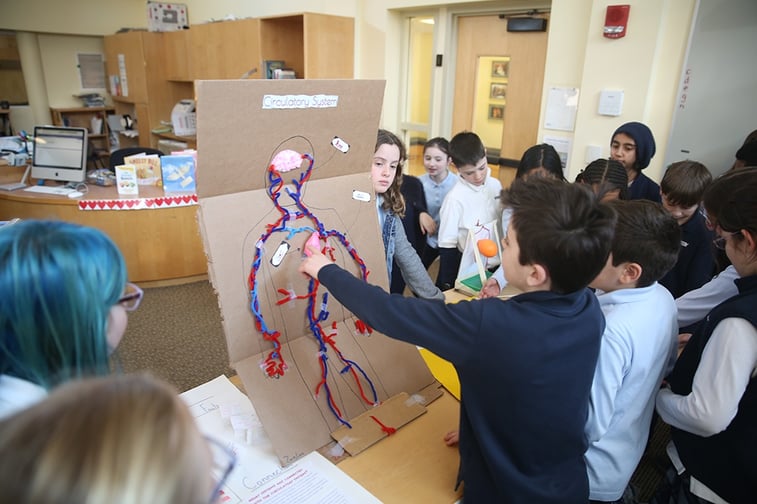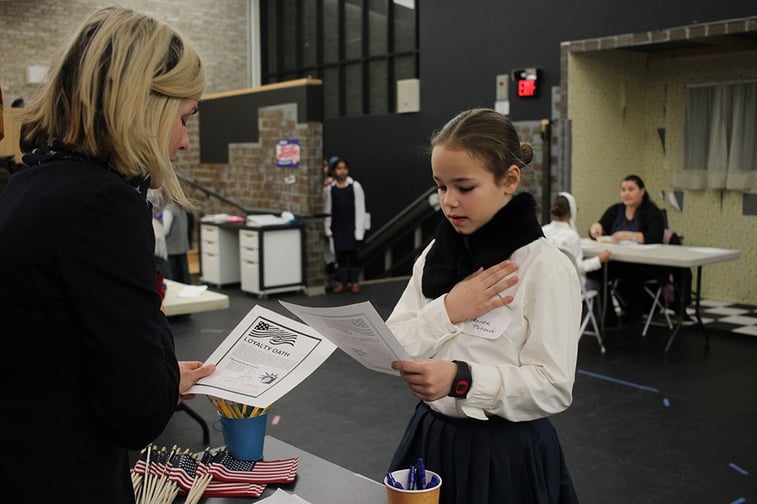Do you remember the last time you learned something new?
Imagine being at work and you're given the opportunity to look at any issue of importance to you, to research it, explore it and use your new understanding to act upon it and bring about change. Working in a small group of like minded peers, each with their own perspectives, you use this synergy to truly make a difference in your workplace and/or community. This might sound like the work of scientists at the threshold of new discoveries, the economist struggling with issues on the global economy or the strategist determining a way through a political dilemma. But at Whitby, this is the 'work' of Grade 4 students.
Over the coming months our 4th graders are challenged to conduct a collaborative inquiry around an issue they are interested in, take action on their learning and share their findings and experience with their school community. The entire process is called the PYP Exhibition – a powerful student-driven learning experience. While students have the guidance of mentors, a lot of their learning is self-directed. They conduct research using primary and secondary resources, share their findings with others, discuss, disagree, compromise and make decisions about presenting and acting upon their learning. Certainly this is a challenging task for our grade 4 students, but one that they are well prepared to embrace.
I can confidently say that because the learning experiences our students enjoy from the youngest learners through the continuum are thoughtfully designed to go beyond academic rigor.
I can confidently say that because the learning experiences our students enjoy from the youngest learners through the continuum are thoughtfully designed to go beyond academic rigor. Teachers are highly intentional in their planning for teaching and learning, striving to build not only a love of learning but also instill in their students an awareness of how to learn and who they are as learners. Learners of all ages are regularly reflecting with teachers and peers not only on their academic goals but also on the skills that allow them to become effective learners.
Think about the last time you learned something new, something of importance to you in collaboration with others. It's likely you had to acquire new knowledge, comprehend, analyze, and synthesize it. You had to collaborate with others, accept responsibilities and make group decisions. You had to communicate effectively and present your findings. To do that you had to manage time, resources and organize the work flow. These skills sometimes are called soft skills or 21st century skills. IB programs call these skills Approaches to Learning. They are an integral part of the Whitby continuum.
Approaches to Learning
Teaching extends far beyond the content and concepts in a given subject area. We invest time to integrate the teaching of key skills that help our students become better learners as well as better people. The IB Program calls these Approaches to Learning (ATLs) and they include critical-thinking skills, reflection skills, organization skills, collaboration skills, affective skills, information literacy and media literacy skills. ATLs facilitate student learning in a variety of areas such as how they manage time and tasks effectively, how they work with others, how they manage their state of mind and how they use language to communicate. These ATLs also help students become more aware of the learning process and understand their strengths and challenges as learners.
Teaching extends far beyond the content and concepts in a given subject area. We invest time to integrate the teaching of key skills that help our students become better learners as well as better people. The IB Program calls these Approaches to Learning (ATLs) and they include critical-thinking skills, reflection skills, organization skills, collaboration skills, affective skills, information literacy and media literacy skills. ATLs facilitate student learning in a variety of areas such as how they manage time and tasks effectively, how they work with others, how they manage their state of mind and how they use language to communicate. These ATLs also help students become more aware of the learning process and understand their strengths and challenges as learners.
Do you remember the joy of exploring something that is relevant and significant to you? Chances are you were highly motivated and persistent in your pursuit of knowledge and understanding, you made connections to your own prior experiences and to current events. We strive to make learning at Whitby purposeful and interesting for students. Research tells us that interest is a powerful motivator.
In the article "How the Power of Interest Drives Learning," Anne Murphy Paul says "When we’re interested in what we’re learning, we pay closer attention; we process the information more efficiently; we employ more effective learning strategies, such as engaging in critical thinking, making connections between old and new knowledge, and attending to deep structure instead of surface features. When we’re interested in a task, we work harder and persist longer, bringing more of our self-regulatory skills into play."
So how do we harness the students' interest in learning?
To achieve that we challenge students to engage with broad conceptual ideas that help them make sense of their world rather than present them with isolated facts. Students are making connections between the subject areas and their explorations. They understand that learning transfers and that they can apply learning strategies on other contexts.
Consider the first unit of Grade 4 this year. Students explored how our choices can support the sustainability of resources. They had hands on experiences working in the Whitby garden cultivating vegetables and at the same time they learned about inequality and hunger in our own community.
They reached out to local chapters, learned about needs and how various organizations help, and they supported their causes by sharing produce they have grown. Students learned and applied their knowledge about measuring area and volume when they needed to determine how much topsoil is needed for the plants. Finally, students acted on their learning with the goal of making a positive difference in their school community.
The next unit explored body systems and how they interact. Students engaged in small group research on specific body systems, they read non fiction books for specific information and learned how to structure their informational writing. They developed skills in note taking, paraphrasing and citing resources. In addition, they created a knowledge product to assist them in sharing their information with their peers.

A highly relevant unit just begins in Grade 4. Students are delving into an inquiry about reasons and consequences for migration. Our case study is the migration to the U.S. in the 1900s. However, our students quickly realized that many of them are migrants themselves and are making connections to their own situation and to current events. Therefore, they move far beyond learning simply about a specific time in history. Students experience that big ideas are timeless and transferrable — that their new learning helps them make sense of their world here and now.
Every learning strategy students experience within a unit of inquiry or in a subject specific context is building the capacity of our grade 4 students to engage confidently in the more self directed exhibition process.
Furthermore, through intentional and purposeful practice students develop skills and attitudes that promote lifelong learning.

This years' exhibition will explore the idea that understanding global and local issues allows us to collaborate, take action, and make a difference.
This frame allows students to dig deeper into a topic they are truly passionate about, We hope it will inspire students to think about their role in making a difference in their communities and become more aware of current issues and events. Furthermore, they will apply their prior knowledge, understandings and skills in an authentic context experiencing the tensions, solutions and joy that comes with an exciting learning experience.
I believe that we can only make the world a better place by being better ourselves. This invaluable learning experience allows students to experience that authentically. That is the power of the exhibition.


